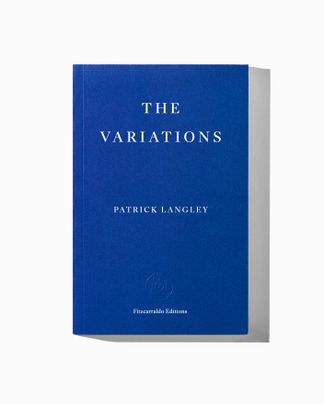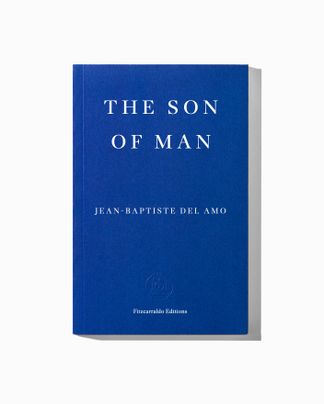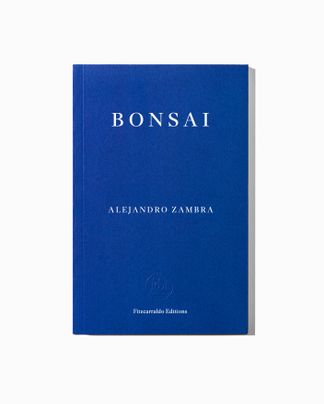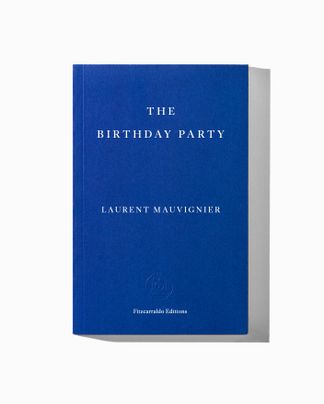Brothers Jackson and Frank live on the margins of a big urban sprawl. From abandoned tower blocks to gleaming skyscrapers, their city is brutal, beautiful and divided. As anti-government protests erupt across the teeming metropolis, the brothers sail in search of the Red Citadel and its promise of a radical new way of life. A striking portrait of the precarity of modern urban living, and of the fierce bonds that grow between brothers, Patrick Langley’s debut Arkady is a brilliant coming-of-age novel, as brimming with vitality as the city itself.
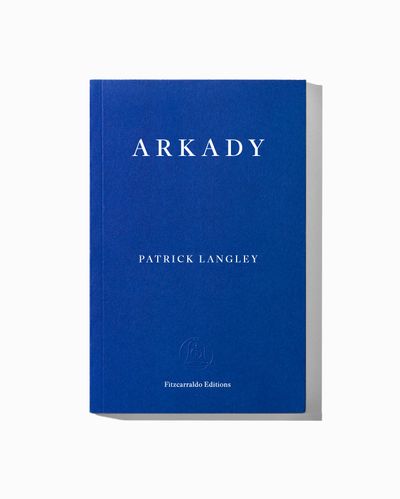
Arkady
Published 21 March 2018 (UK) | 4 September 2018 (US) | French paperback with flaps, 200 pages
Longlisted for the RSL Ondaatje Prize 2019
Arkady
I. ANOTHER COUNTRY
A fan stirs the room’s thick heat as the officers talk. Jackson wags his legs under the chair and watches his shoes as they swing. The officers speak about beaches. A pathway. Red flags. The story does not make sense. When they finish it, Jackson looks up. The door is open. It frames a stretch of shrivelled lawn and a column of cloudless sky. Colours throb in the heat.
‘Do you understand?’ the woman asks.
‘We are sorry,’ says the man.
Blue uniforms cling to their arms. Black caps are perched on their heads. Jackson peers into the caps’ plastic rims, which slide with vague shadows and smears of light. The officers mutter to each other and swap glances with hooded eyes. The breeze through the door is like dog-breath, a damp heat that smells faintly of rot.
‘Where’s my dad?’ asks Jackson.
The man’s thumb is hooked through his belt. He stands like a cowboy, hips cocked.
‘We don’t know,’ he sighs. ‘Our colleague saw him a moment after. We’re sure he’ll come back soon. You have a small brother? We take you to the place, and you tell him. Tell him your father is coming back. We’ll find him. I promise. Right now.’
They are staying on the side of a mountain, a short but twisting drive away from the nearest coastal town. The hotel is enormous. From a distance it resembles a castle, its high walls strong and stern, its red roofs bright against the mountain’s grey. The valley below is dotted with scrubby bushes and half-finished breezeblock homes. At its centre, a dried-up riverbed runs through copses of stunted trees: a jagged path connecting the hotel to the town.
Frank is in the crèche with the other toddlers. They crawl and stumble on the floor, slapping primary-coloured mats with chubby palms. Jackson glances at the sprinkler outside. Threads of water glitter like glass until they shatter and fall. He asks the woman when the children go home.
‘When does the session finish, you mean?’ she asks. She is English. Her eyes are the dull blue of cloudless skies. ‘Is everything alright?’
Jackson’s brother is in the far corner, a monkey teddy in his hand. He is wearing his robot pyjamas; his smile makes Jackson smile.
‘You can come back at five o’clock, if you like,’ the woman says. ‘We have a painting class. Do you like art? You could do a jigsaw?’
Frank smacks a beat on the monkey-doll’s stomach. Thump-thump!
‘The one in the corner,’ says Jackson.
‘You know him?’
‘He’s my brother.’
The woman smiles at Jackson, briefly narrowing her eyes. ‘He’s very good,’ she says.
The swimming pool is white and blue. It hurts Jackson’s eyes to look at it. In the evenings, before dinner, his mother will swim for a while and then relax on a lounger, sunglasses masking her eyes, and read a book while their father plays tennis, goes walking, or naps. Today a strange woman has taken his mother’s lounger. Her legs are bronzed and dimpled, with blue worms squiggling under the skin. Her lips are the colour of cocktail cherries, sticky and red.
‘You alright there pal?’
The man is on a lounger. Gold things shine at his knuckles and neck: he is either a king or a thief.
‘Here on your own?’ The man is from Jackson’s city. That voice. ‘Where are your parents?’ He is wearing skimpy Y-front trunks, the kind Jackson’s mother calls budgie smugglers. His tanned skin shines like oiled meat. ‘You speak English? Española? Where are your parentés, your grandays persona? Big people, you know?’ He chuckles. ‘Mum? Dad? Parents? No?’
A waiter appears with a tray. On his tray is a bright blue drink in a tall glass shaped like a space rocket. A wedge of pineapple, skewered on a toothpick, glistens in the sun. The woman places her hand on her heart and – ‘Ah!’ – her teeth flash as she gasps.
‘My man,’ says the man on the lounger, clicking his fingers. ‘Over here.’
The woman slips the fruit into her mouth.
‘Of course,’ says the waiter, smiling. The red splodge on the pocket of his shirt is the hotel’s logo: a mermaid sitting sadly on a rock. ‘Another beer, sir?’
Everyone smiles.
The budgie-smuggler shakes his head. ‘This boy,’ he says, ‘he’s been standing there for the last five minutes. Hasn’t said a thing.’
‘I see,’ the waiter says.
A crucifix hangs at the waiter’s neck. His nose is long and straight, like a statue’s. He is tall and strong and has very white teeth but his eyes are too close together. ‘Hey lil’ man,’ he says, walking over, smiling so wide the creases reach his ears. ‘You looking for your mother? You want me to try and call her?’
Jackson squints. Sweat pours down his forehead and stings his eyes. ‘She doesn’t have a phone,’ he says. ‘People call her all the time and she hates it. I went to tell Frank, but he’s playing with a monkey.’
The waiter frowns and sticks his lower lip out. ‘There’s no monkeys here.’
Jackson explains about the crèche.
‘Ahhhhh, sea sea sea – your baby brother! I remember now.’ Spanish people love the sea, they say it all the time. ‘Well, let me think.’ The waiter taps his chin with a finger. ‘Ah, I saw your father this morning. He bought a snorkel from Reception.’
Jackson nods. ‘That was before.’
When the waiter squats beside him, the muscles on his lower legs bulge. He smells of lemon peel, soap, and sweat.
‘Why don’t you come with me,’ the waiter says. ‘We’re gonna do a search. I’m sure she’s not far.’
(…)
‘Thick with smoky atmosphere and beautifully controlled – this is a vivid and very fine debut.’
— Kevin Barry, author of City of Bohane
‘Patrick Langley’s Arkady is a strange trip – luminescent, jagged and beautiful. A debut novel that twists, compels, descends and soars. I highly recommend it.’
— Jenni Fagan, author of The Panopticon
‘Arkady is a utopian project: not the top-down kind that never works, but the bottom-up kind that (in this case anyway) works so well it reclaims something of the world. It’s hand-built, beautifully, from loose memories, salvaged people, and wild blooms of the psychogeographical sublime. Tense, vivid and humane, this novel gives us not only a dark future but also – over the horizon, past the next riverbend, through that hole in the fence – a chance of saving ourselves from it.’
— Ned Beauman, author of Boxer, Beetle
‘Langley’s invented metropolis was a joy to spend time in. In my visual imagination, it looked as if it had been half-painted by L. S. Lowry and finished off by H. R. Giger. And the ambience was a little bit Stalker, and a little bit Tekkonkinkreet. But then at the heart of it all was this complex, tender relationship between brothers, and Langley’s writing – which somehow managed to be both unembellished and evocative.’
— Sara Baume, author of A Line Made by Walking
‘The Romulus and Remus of a refugee nation embark upon a drift across livid cities, liberatory canals and compromised occupations in a parallel present mere millimetres from our own. Langley gives to the reader the taste of the Molotov fumes and the bloody heft of the personal-political in this propulsive, acid fable, a dérive for the age of urbex. How can the orphaned subject escape the surveillance state? Read on to find out. We, also, are in Arcadia.’
— Mark Blacklock, author of I’m Jack
‘[A] haunting and brilliant debut.’
— Luke Brown, author of My Biggest Lie
‘A distinctly post-Brexit novel, Arkady is set in an unnamed city that both is and isn’t London, thick with the atmosphere of the riots of 2011, and the stricken, devastated aura of the days after the Grenfell fire. It is oblique, and bleak: it is never quite clear what has happened or is happening, what is it about our world that has finally broken or overflowed…. But there is always a flutter of hope in the dark, and in Arkady it dwells in the unshakeable brotherly love between the novel’s two heroes, Jackson and Frank [whose] relationship is so beautifully etched … Arkady suggests that we’ll build our own arcadias out of the dreams that haunt us, both threatening and protective.’
— Lauren Elkin, The Guardian
‘Arkady raises questions about what happens after capitalism finally collapses…. It’s difficult not to think of JG Ballard throughout, but Langley’s unforgiving urban scapes also recall the sound of dubstep pioneer Burial or early pirate-station grime. The prose crackles with energy as the narrative follows the constant movement by placing the reader on a well-oiled tracking dolly, often zooming out to remind us of the bigger picture. Langley is a highly visual writer and Arkady an assured allegorical debut about a near-future Britain that is potentially only a recession or two away.’
— Ben Myers, New Statesman
‘Though the plot remains firmly within a vice of gritty reality, the prose at times takes on a mythical quality, as man and nature coalesce in a seamless union … These are the moments where Arcadia, that utopian idyll, feels within reach…. Brotherly love emerges as the sweet aftertaste of the novel, precisely because Langley evokes their relationship with such verisimilitude.’
— Matt Janney, Culture Trip
‘[A] timely evocation of social strife at a time of increasing political polarisation. The novel’s preoccupation with the invisible socio-economic topography of the city (“maps of ownership, maps of property, maps of power”) will resonate with anyone who has pondered the vexed question of gentrification and housing inequality…. Langley’s bleak vision of a city effectively at war with its inhabitants – on behalf of the property moguls and financial speculators who own it – is a pointed extrapolation of the present state of things.’
— The Irish Times
‘Arkady traces the lives of two brothers from early childhood, following their treacherous journey together through forbidding urban wastelands, towards some kind of redemption or hope. It’s a gripping story, and Langley’s rich language and profound empathy combine to make Arkady an incredibly powerful novel.’
— Maya Kalev, Dazed
‘Langley avoids totalizing language. You can see him scalpelling out what over-serves, offloading words too bloated with connotation.… The city’s name is never mentioned, attuning readers instead to the unique texture of its hinterlands: crushed glass and asphalt, gnawed chicken bones and scrubgrass, the filthy waterways crisscrossing it in secret, another mazy layer to its labyrinth. … Foreign to the literary Londons of before, it’s a London that feels faithful to the one that I know now: one where squatters can occupy millionaires’ mansions, kipping on the marble floors and unfurling antifa flags from the balconies; one where the empty lot you raved in one week is bulldozed, built over the next; one where, in spite of its weighty history, traces of habitation can vanish as quickly as if they were in water.’
— Alex Quicho, C Magazine
‘A prophetic tale of urban dystopia … In Arkady … the protagonists use the power of their imagination to remake the world, and they find solace not by dreaming of another place, but by looking closer at the city itself. They reimagine its forgotten and overlooked places.’
— Matthew Turner, Elephant
‘Patrick Langley’s debut novel Arkady is a veiled vent about the housing crisis, a clever tantrum about our immediate future. It never quite situates itself in a specific year, instead remaining temporally hazy. On first reading, I understood it as our imminent apocalypse, softened to the point of credibility: a subdued economic and ecological sci-fi reminiscent of Ballard. But on second reading, it seemed to just be the world, our world: a world of dickhead men yelling at women on the streets, ice-cream trucks on hot days, and drunk party-goers spilling onto pavements.’
— Sylvia Secci, Oxonian Review
Praise from Twitter:
‘A gorgeous novel… A livid and visionary brotherly love story set among our ruins. I loved it.’
— Max Porter, author of Grief is the Thing with Feathers
‘Grim but excellent.’
— M. John Harrison, author of You Should Come With Me Now
‘I haven’t been able to stop thinking about [Arkady] – such a tender, hopeful tale of brotherhood and belonging, set against vividly imagined urban topographies. I haven’t read anything like it in ages.’
— Sophie Mackintosh, author of the The Water Cure
—
Partisan Hotel interview Patrick Langley
—
Patrick Langley’s first novel, Arkady, was longlisted for the RSL Ondaatje Prize and the Deborah Rogers Writers Prize. The Variations is his second novel.

